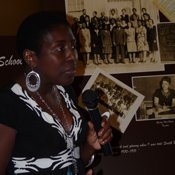Smith Robertson Museum and Cultural Center Manager Pam Junior dashed arguments that there is little to do in the city of Jackson.
"A lot of people say there is nothing to do in Jackson. There is something to do. There is always something to do, but you have to come out of your house and find out about it," Junior told a crowd of about 40 at Koinonia Coffee House's Friday Forum this morning. "You can't stay in and say there's nothing to do. There are all kinds of museums here."
Junior touted the existence of Smith Robertson Museum as a particularly remarkable example: "To have an African American museum that not only talks about the school, but also talks about you, and about your existence? Everybody needs to know about different cultures. It's wonderful."
The museum is the result of former Human and Cultural Services Department Director Otha Burton's appeal to then-Mayor Dale Danks to turn the city's first African American public school, closed since 1971, into a museum. Junior said supporters wound up buying the building for $1 and renovating it with the help of community development block grants. After serving as a segregated black school for most of the last century, the facility closed following forced integration of Mississippi public schools. District leaders shipped most of the school's students to formerly white schools.
Junior pointed out that American author Richard Wright never named the school he attended, but others who went to school with him happily identified that school as Smith Robertson. She described Wright , from second-hand accounts, as the intelligent type of student who "tended to finish his tests first" and then "tugged girls' hair" or "put his foot out to trip people" with his spare time.
As a student during the turbulent years of desegregation, Junior described her first time in an integrated school as problematic, with white teachers commonly ignoring her attempts to "put up her hand and answer questions." Feeling more isolated, Junior confessed that she generally felt detached throughout the remainder of her public school years.
Today, she advocates heavily for the lessons and history the museum contains, and explains that few cities have a museum dedicated to African Americans' unique cultural experience.
"The museum is a lesson in you," she said.
The facility will receive the Smithsonian Institution's traveling exhibit "Freedom's Sisters" from May 21 to Aug. 14 this year. The exhibition, featuring people such as slave liberator Harriet Tubman and Black Panther Party member Kathleen Cleaver, among others, portrays 20 women "whose work for liberty and equality continues to push aside limitation that constrict Americans," according to a Smithsonian press release.
The museum is open 9 a.m.-5 p.m. Monday through Friday, and 10 a.m.-2 p.m. Saturdays. Admission is $4.50, $3 seniors, $1.50 children under 18. Call 601-960-1457 for more information.



Comments
Use the comment form below to begin a discussion about this content.
comments powered by Disqus